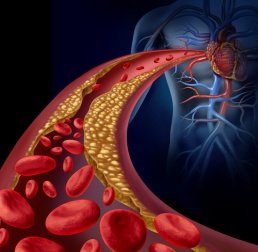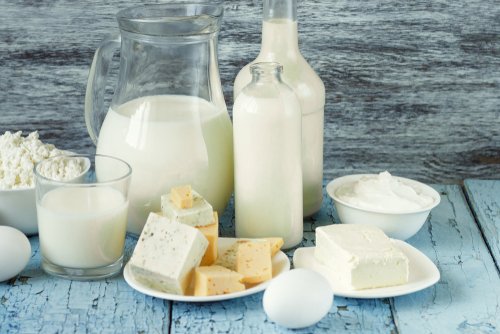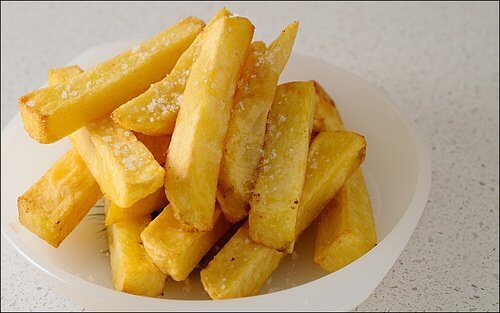Diet Plan to Help You Lower Triglycerides


Reviewed and approved by the pedagogue in physical education and nutritionist Elisa Morales Lupayante
Hypertriglyceridemia, or, as we more commonly know it, high triglycerides, is a condition where there’s too much saturated fat in your body. When this situation arises, it’s important to take steps to reduce your triglyceride levels. Therefore, today, we’ll give you some information about them and what you can do to lower triglycerides through your diet. Otherwise, you could put your health at serious risk.
The Danger of High Triglycerides
When we talk about triglycerides, we’re referring to the saturated fats that your body creates. Fatty acids produce them.
When your body makes too much (over 150 mg / dl), you have hypertrigluceridemia. If so, you should treat this immediately. Otherwise, it could lead to atherosclerosis.
If you have high levels, it’s best to talk to your doctor immediately to find the best treatment.
In addition, you can supplement this with a diet to lower triglycerides. This should contain mostly foods low in saturated fats.
The Causes of High Triglycerides
There are several factors that can cause high triglyceride levels. Some of them are:
- Genetics. Family history of hypertriglyceridemia puts you at higher risk of getting it later in life.
- Poor diet. Eating too much fat and protein, combined with not getting enough fiber, leads to producing too many triglycerides.
- Obesity and overweight. People who are overweight are at a higher risk of having high triglycerides. Therefore, you should try and control your weight as much as possible.
- Lack of physical exercise. Combined with a poor diet, sedentary lifestyle significantly increases your risk of developing hypertriglyceridemia.
- Cigarettes. There are many reasons why smoking is bad for you. In this case, it’s because it raises your triglyceride levels.
Check out this article: Five Slimming Vegetable Juices You Should Try
How to Lower Triglycerides with Your Diet
In addition to the medication your doctor will give you, it’s important to follow a diet to lower triglycerides. This diet plan will include foods that will help treat your condition.
Diet Plan to Lower Triglycerides

Fortunately, with something as simple as changing your diet, you can help make these elements normal again.
Below, we’ll show you some foods that will be your friends to lower triglycerides and bring them to normal levels.
- Dairy products. You can eat yogurt, skim milk or non-fat cheese.
- Eggs. You can eat egg whites every day. However, you shouldn’t eat the yolks more than three times a week until your triglycerides go back to normal levels.
- Meat. It’s best to eat lean meats or chicken breasts. Also, you can have beef up to twice a week. In any case, it’s best to cook meats by grilling or baking them. In addition, it’s best to eat fish, especially salt water fish.
- Almost all vegetables, preferably raw.
- Whole grains. The most beneficial whole grains for you are oats, wheat germ, wheat bran and brown rice. These contain fiber, which help you eliminate lipids.
- Fruit. It’s best to eat fruit with its peel, since that’s where all of the fiber is.
- Water and juices. Make sure that the juices are made with natural fruit juice. In fact, these contain more vitamins and minerals.
Foods that You Should Avoid

A person with high triglycerides should avoid eating certain foods to get their levels back to normal. Next, we’ll show you what not to eat.
- Sweets. In general, you should avoid sweets. At most, you can occasionally let yourself have a little bit of natural jam.
- Coffee. While you’re on a diet to lower triglycerides, avoid drinking coffee, especially drinking too much. However, you can enjoy a little every once in a while.
- Sodas. Stop drinking sodas and pasteurized drinks. Remember, they have lots of sugar and other chemicals.
- Salt. Generally, people with high triglycerides also have high blood pressure. Therefore, you should lower your salt levels.
- Avocados. Although they’re delicious, you need to eliminate them from your diet to lower triglycerides since they contains fatty acids. You can eat one every once in a while, but not in large quantities.
- Coconuts. Although you might not think so, coconuts contain a lot of fat. Therefore, you need to eliminate them from your diet if you want to bring your levels back to normal.
- Fried foods. The worst enemy for your health if you have this problem is fried foods. Avoid them at all costs. They immediately impact your triglyceride levels. Instead, grill your foods, roast them or bake them.
- Packaged foods. You should avoid packaged foods because they are often high in fat, specifically saturated and trans fats. These are the ones that doctors consider bad and can drastically raise your triglyceride levels.
Discover: 6 Amazing Keys to Lowering High Triglycerides at Breakfast
Recommendations
Overall, the best thing to do if you have high triglyceride levels is get specialized medical attention. If your triglyceride levels are slightly too high, you might be able to lower them with your diet. However, if they’re very high, you’ll need to take other measures, like medication.
In addition, regular exercise can be very beneficial in helping to lower triglycerides. Therefore, don’t hesitate to sign up for a sport or gym membership on your own.
All cited sources were thoroughly reviewed by our team to ensure their quality, reliability, currency, and validity. The bibliography of this article was considered reliable and of academic or scientific accuracy.
- MedlinePlus. Triglicéridos. 2018. Available at: https://medlineplus.gov/spanish/triglycerides.html. Accessed 11/21, 2018.
- Servicio Madrileño de Salud. Recomendaciones dietético nutricionales “para pacientes con hipertrigliceridemia”. 2018. Available at: http://www.madrid.org/cs/Satellite?blobcol=urldata&blobheader=application%2Fpdf&blobheadername1=Content-disposition&blobheadername2=cadena&blobheadervalue1=filename%3D25.HIPERTRIGLICERIDEMIA.pdf&blobheadervalue2=language%3Des%26site%3DPortalSalud&blobkey=id&blobtable=MungoBlobs&blobwhere=1352869766548&ssbinary=true. Accessed 11/21, 2018.
- Wikipedia. Hipertrigliceridemia. 2018. Available at: https://es.wikipedia.org/wiki/Hipertrigliceridemia. Accessed 11/21, 2018.
This text is provided for informational purposes only and does not replace consultation with a professional. If in doubt, consult your specialist.








